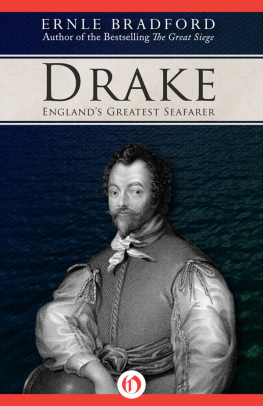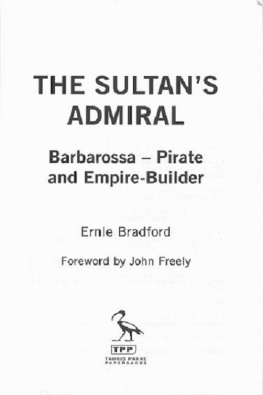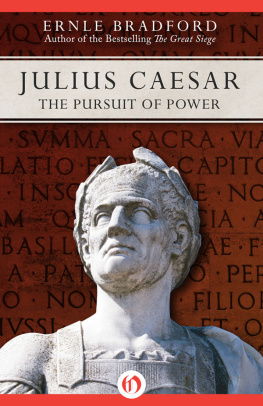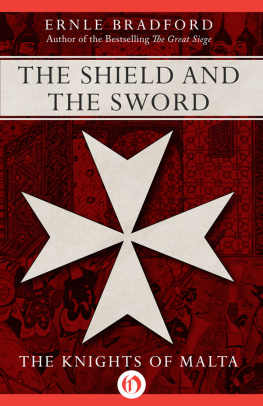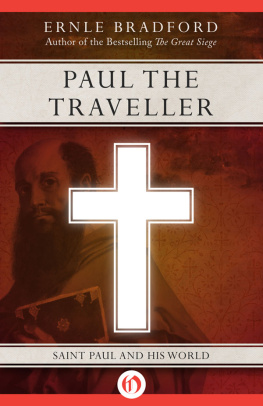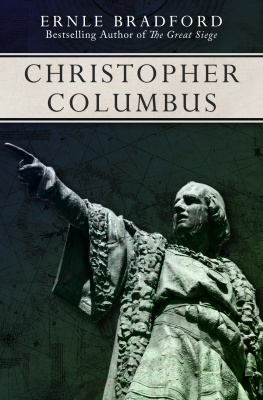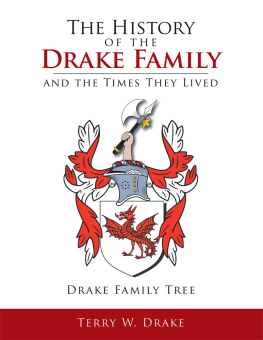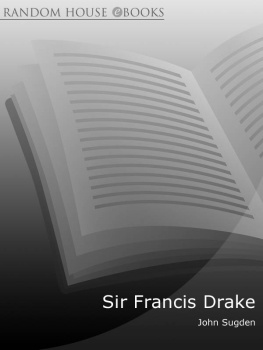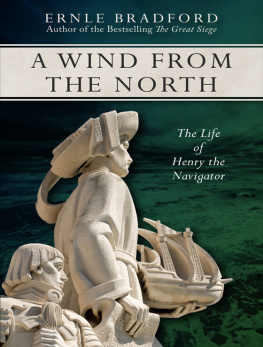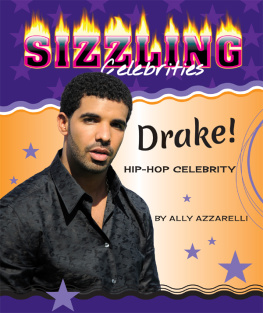Drake
Englands Greatest Seafarer
Ernle Bradford

For
My Mother
The wind commands me away. Our ships are under sail. God grant we may so live in His fear as the enemy may have cause to say that God doth fight for Her Majesty as well abroad as at home.
Haste! From aboard Her Majestys good ship the Elizabeth Bonaventure, this 2nd April, 1587.
Sir Francis Drake
Preface
Drake long ago passed into the Pantheon of Heroes of the English-speaking world. Like Nelson, he has become a byword for courage, audacity, and the seamanlike qualities of patience and endurance. But, unlike Nelson, he is usually seen as a somewhat shadowy figure. He is not known to have had a romantic private life, something to whet the appetite of biographers, playwrights, or film-makersthose fabricators of modern mythology. He has tended to become one of those legendary figures to whom lip service is paid, but who is rarely thought of as having been a living, breathing, human beingwith all the compounded virtues and vices that go to make up a complex and unusual man.
Like certain other heroic figures, Drake has been put aside on that special shelf which is reserved for men who seem a little more than human. Yet, as even a cursory examination of the facts of his life reveals, Drake was much more than a simple Elizabethan sea-dog. If we know little or nothing about his private life, his public life is extremely well documented. He emerges as an extraordinary example of a self-made man, as a navigator of outstanding brilliance, a genius of naval warfare, and as an astonishingly able partisan-leader. He was a legend in his own lifetime.
As his contemporary, the historian John Stow, wrote of him: He was also of perfect memory, great observation, eloquent by nature, skilful in artillery In brief, he was as famous in Europe and America, as Tamberlane in Asia and Africa. If Drake was no more than that, he would still command attention, even though he might seem to have little relevance to inhabitants of the western world in the second half of the 20th century. But he has another and greater claim upon our attentionhe was far in advance of his age in his humanity and compassion. His treatment of Spanish prisoners, his conduct towards Negroes and American Indians and his consideration towards his own sailors mark him as exceptional in his own age, and still worthy of emulation in ours. As a seaman he was the first to realise that there could be no distinctions of caste or class aboard ship, but that the gentleman must haul and draw with the mariner, and the mariner with the gentleman. He thus anticipated by some 400 years the democratic navies of today. If England had taken his lesson properly to heart, she would have had a far more efficient fleet in the first half of the 20th century.
Drake, and his life and his times, held a particular fascination for Victorian biographers and historians. They felt that they had inherited an empire which he, more than almost any other, had helped to prepare for them. Sir Julian Corbettto whom all subsequent students of Drake must always remain gratefultook as the epigraph for his Drake and the Tudor Navy Sir Walter Raleighs saying: Whosoever commands the sea commands the trade; whosoever commands the trade of the world commands the riches of the world, and consequently the world itself.
Such a statement may seem questionable nowadays, when it is apparent that only a giant land-mass can enable a nation to withstand the assault of modern war, as well as to own those natural resources without which an industrial society can hardly flourish. If, for a modern Englishman, Drake means less in terms of his successful exploitation of sea-power, he has a new interest in being one of the first practitioners of brinkmanship. In this, he must inevitably be seen as the instrument of Queen Elizabeth, that remarkable woman who understood better perhaps than any before or since how to handle the conduct of a cold war. The Queens virginity, or more accurately, her potential marriageability, took the place in 16th-century Europe of the modern balance of terror. Throughout her lifetime she held a Damocles sword over the head of Philip II, and the thing that made her potential alliance with another European ruler so dangerous to Spain was the English Navywhich Drake, more than any other man, had forged into a terrifying weapon of war.
Drake had few of the courtiers graces which enhanced such royal favourites as Raleigh, Leicester or Essex. Nevertheless, he managed to amass a fortune, endear himself to the Queen, and keep his head. From the moment that he had, as it were, declared a personal war against Philip II, he consciously set himself against the largest empire that the world had ever known. He inflicted more damage upon it than whole nations or large armies ever managed to do. Drake was a living proof thatnotwithstanding certain modern theoriesone individual can indeed change the course of history.
In the past twenty-five years I have been fortunate enough to sail small boats over many of the seas, and visit many of the places, which Drake knew when all the world was young. A great number of the placesthe Canary Islands, the Cape Verde Islands, and the Atlantic seaports of Spain and Portugalhave not greatly changed since Drake first came rolling down towards them in his small square-rigged ships. It is not true that, as Tristan Corbire wrote, La merelle nest plus marin! Seen from the deck of a small sailing boat, the sea is as it ever wasunpredictable and uncorrupted. Perhaps it is no real advantage for the biographer of a naval hero to have a close acquaintanceship with the places and the seas that his subject once knew. Yet I cannot help thinking that all the libraries of the world will not help towards an understanding of the relationship between Drake and Doughty so much as a transatlantic passage in a 20-ton boat.
For assistance and information over the past years, I am particularly indebted to A. A. Cummings, F.M.A., of the City Museum and Art Gallery, Plymouth, and to W. Best Harris, F.L.A., Librarian of the City of Plymouth. I would also like to express my thanks to the authorities of the National Maritime Museum, Greenwich, the British Museum, and the London Library. I am also indebted to the University of California, the California Historical Society, and to the Mariners Mirrorthat invaluable publication in which Professor E. G. R. Taylor and others have made so many notable contributions to Drake scholarship. I owe a considerable debt of thanks to Francis Dillon of the B.B.C. for many stimulating conversations about Drake; for his radio play The World Encompassed; and for his assistance in the matter of old ballads and songs relating to Sir Francis Drake.
As a Zen Buddhist saying has it, Unless at one time the perspiration has streamed down your back, you cannot see the boat sailing before the wind. Although I can hardly feel that I have made any startling discoveries about Drake, I felt, as I read about him, that I was discovering a man where before, for myself at least, there had only been an impersonal hero. I hope that I may perhaps help others to see him and his ship, alive and vital sailing before the wind.
Chapter One
Voyage into Sunset
It was August 1595 and the slopes of Plymouth Hoe were patterned with men, women and children eager to see their first and greatest citizen preparing to set sail. Landsmen, but almost all of them allied in one way or another to the sea, they knew through whose grace it was that their clothes sat snug upon them, that enseignes sparkled in the merchants hats, and enamelled galleons sailed on the breasts of their women. Their children drank the clean water that he had (almost miraculously it seemed) conveyed down from the bare ridges of Dartmoor into their city. But for him there might have been no city standing, and but for him certainly no press of shipping would have been sidling alongside the quays of the Barbican or riding in the lee of St. Nicholass Island. Soon his ships would be leaving Plymouth.

